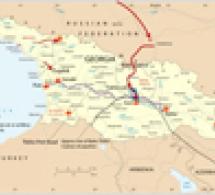 |
 |
Russian Escalation of Georgian Crisis Continues
The Russo-Georgian conflict has continued this week, despite the ceasefire agreement, and is having ripple effects throughout NATO and the Commonwealth of Independent States. Frederick W. Kagan, a Resident Scholar at the American Enterprise Institute, posts regular updates about the conflict and maps of the fighting on the ISW website. Russia has systematically destroyed the Georgian military from the air and on the ground. Russian officials claim that Georgia is violating the armistice agreement by reconstituting the remnants of its army near Tblisi, the capital of Georgia, insisting that they are a threat to Russian troops. In addition, Russia has established a number of "peacekeeping" positions in Georgia in order to ensure that they retain control over security. Russia has also announced increased air training exercises of strategic and general purpose aircraft near North America.
The Russian aim appears to be permanently neutralizing the Georgian military, annexing Abkhazia and South Ossetia, and retaining the ability to intervene unilaterally in Georgia to any extent Moscow desires—including deposing the Georgian government. Nothing the U.S. or NATO has done or has threatened to do appears to have weakened Russian determination in this regard. Russia has matched every NATO/US move with a counter-move or a counter-threat of its own. We are de facto in an escalation game with the Russians, and they appear to be winning. Worse still, Moscow does not appear to believe that the West has the will to escalate enough to win in the end. Russia still hopes that it can split Europe from the U.S., and believes that it can do so. It does not believe that even the annexation of Abkhazia and South Ossetia will lead to meaningful long-term pain because Moscow believes that Russia has become an indispensible nation that the West cannot survive without. According to this view, we will have to come to terms, ultimately, with whatever the Russians decide they want. At this point, there are no indications in the Russian government’s statements or behavior that suggest the current Western approach is adequate to prevent further escalation of this crisis.
